Samsung Batteries in Crisis Again: From Galaxy Note 7 Explosions to Recall of 180,000 Vehicles
![]() 02/18 2025
02/18 2025
![]() 497
497
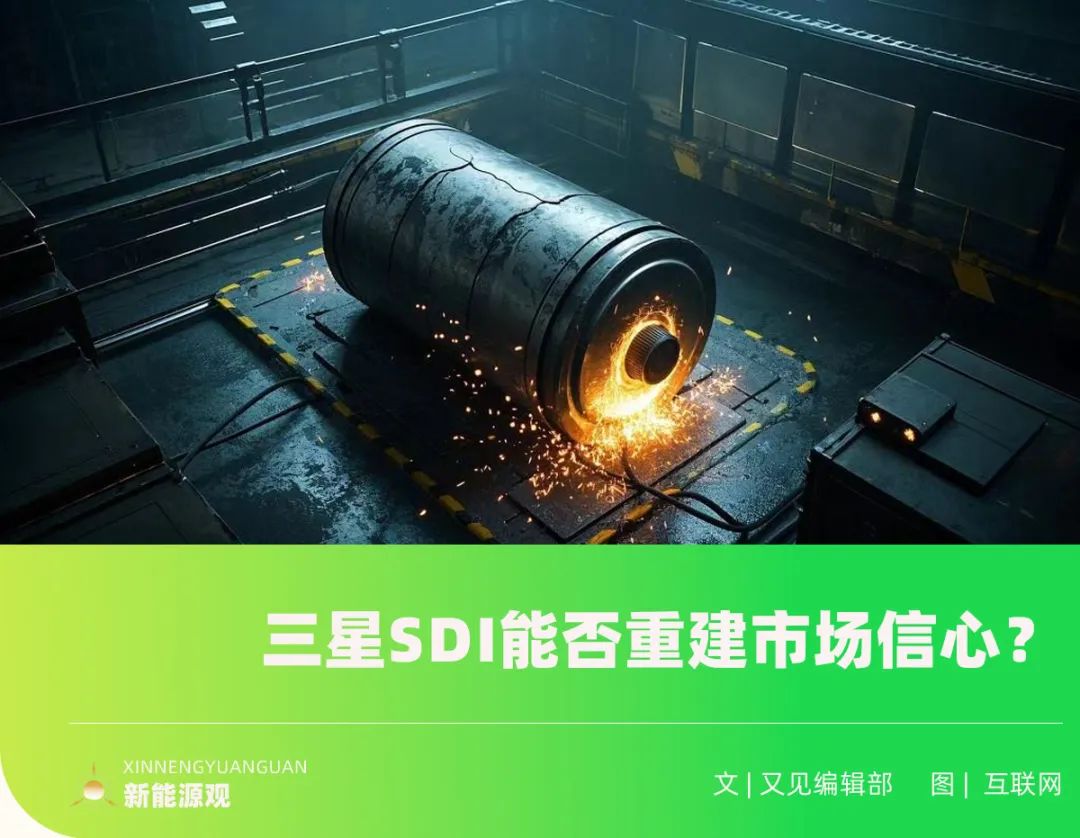
New Energy View (ID: xinnengyuanqianzhan) Original
Full text: 2,861 words, Reading time: 8 minutes
The new energy vehicle market is on the rise, and the safety of vehicle batteries remains a paramount concern across the industry. Any hint of trouble can quickly escalate into a major scandal. Recently, South Korean battery manufacturer Samsung SDI announced a large-scale recall plan involving 180,196 vehicles from brands such as Jeep, Ford, and Audi.
The United States' National Highway Traffic Safety Administration (NHTSA) pointed out in its investigation that the separators within the battery cells of these vehicles occasionally become damaged, leading to potential fires due to internal interactions within the battery cells. More concerningly, some brand owners lack early warning systems, emphasizing the severity and urgency of the issue.
This large-scale vehicle recall is akin to a bombshell, dealing a significant blow to Samsung's battery market share. Consumers are highly sensitive to vehicle safety, and the risk of battery faults causing fires instantly erodes their trust in Samsung batteries. This collapse of trust may directly prompt car companies to be cautious when selecting battery suppliers, and may even result in the termination of cooperation with Samsung.
Samsung batteries may be experiencing their biggest crisis since the Galaxy Note 7 smartphone explosions in 2016.
1. Past Glories: The High Points of Samsung Batteries
Samsung was once a shining star in the consumer electronics field. Confidently pulling out a Samsung Galaxy Note and using the stylus to write and draw on the screen was once a quintessential scene in many high-end business settings.
In the global battery industry, Samsung's subsidiary, Samsung SDI, is a giant that cannot be overlooked. Over the years, Samsung SDI has been a significant player due to its continuous technological innovation and robust large-scale production capabilities. It has occupied a pivotal position in the battery field, profoundly influencing the industry's direction.

Image/Samsung Galaxy Note series smartphones
Source/Internet New Energy View screenshot
In the consumer electronics realm, Samsung's battery products are closely intertwined with our daily lives. As smartphones, tablets, and other mobile devices become an integral part of our lives, long battery life has become a rigid demand for consumers. Samsung accurately grasped this trend, investing substantial resources in research and development, and launched high-performance batteries that were highly sought after by the market.
Take smartphone batteries, for instance. Samsung batteries boast impressive endurance, with a single full charge being sufficient to support a full day of heavy use. Whether it's long phone calls, immersive binge-watching, or playing mobile games, there is no need to frequently search for a power source. More importantly, even after multiple charge-discharge cycles, its battery capacity retention remains excellent, extending the overall service life of the smartphone.
In addition to long battery life, safety is paramount. Samsung's power batteries have undergone rigorous safety tests, exhibiting extremely high stability and safety, effectively reducing the risk of faults during use.
Samsung's success in the consumer electronics field not only built up its reputation but also injected momentum and financial support into its foray into power battery technology research and development. With the booming development of the electric vehicle industry, Samsung has also demonstrated strong prowess in the field of power batteries.
Samsung has collaborated with many internationally renowned automakers, with its partnership with BMW being particularly noteworthy. The power batteries customized for BMW electric vehicles, supported by high energy density, enable BMW electric vehicles to easily meet daily commuting needs, as well as mid-to-long-distance travel such as weekend road trips and short business trips.
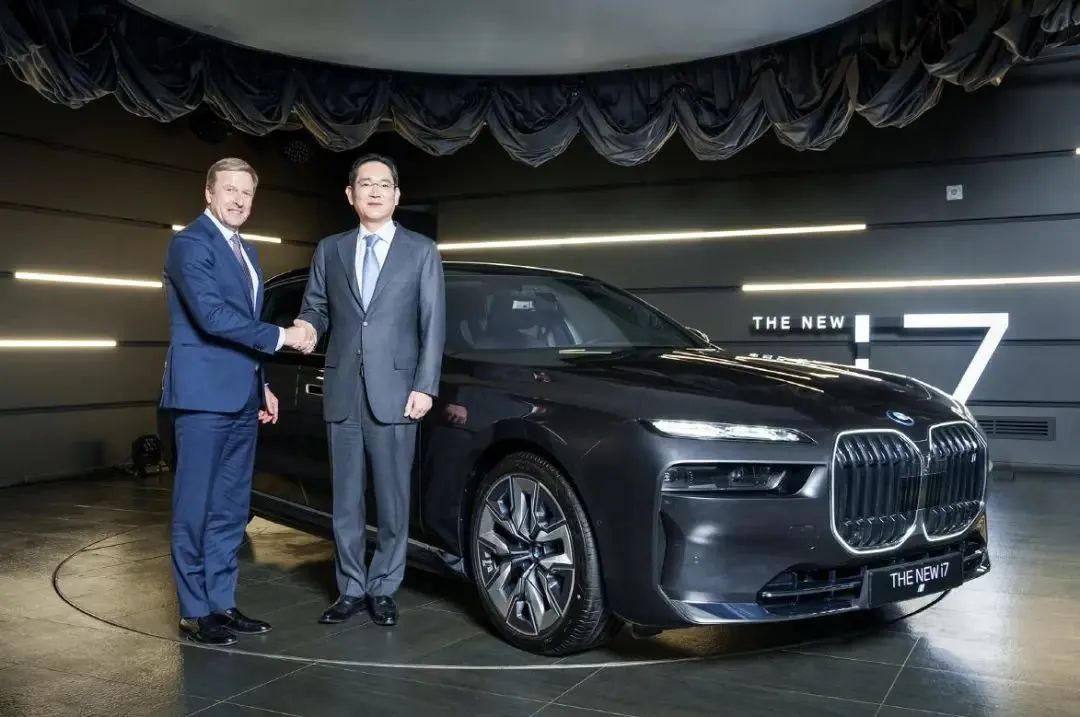
Image/Samsung and BMW chairmen meeting to discuss collaboration
Source/Internet New Energy View screenshot
Collaborating with BMW once allowed Samsung batteries to occupy a significant market share in the power battery field. Especially in the high-end electric vehicle market, Samsung batteries performed exceptionally well and garnered widespread praise.
According to global power battery statistics released by South Korean research institution SNE Research, Samsung's power battery shipments in 2024 were 33.1 GWh, ranking seventh globally. Samsung has formed deep ties with multiple automakers such as General Motors and the Stellantis Group through joint ventures to build battery factories.
However, this large-scale vehicle recall incident has dealt a significant blow to Samsung's battery market share. Samsung batteries, which pride themselves on extremely high stability and safety, are now facing harsh reality.
2. Deep in the Quagmire: The Waterloo of the 180,000 Vehicle Recall
Consumers have always been extremely sensitive to vehicle safety issues. Once there is a serious hidden danger like battery faults that may cause fires, their confidence in Samsung batteries collapses instantly, and automakers will also deliberate carefully when selecting battery suppliers in the future.
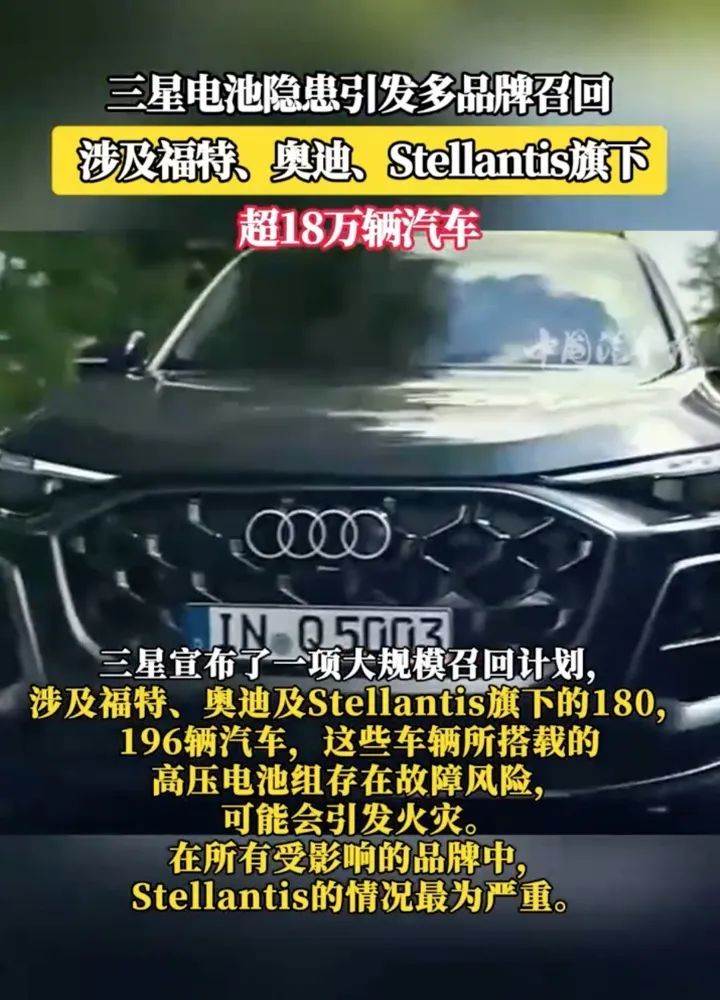
Image/Samsung battery hazards trigger multi-brand recalls
Source/Internet New Energy View screenshot
It is understood that among the total of 180,196 recalled vehicles, 155,096 are Jeep brand vehicles from Chrysler, covering the 2020-2024 models of the Jeep Wrangler 4xe and the 2022-2024 models of the Jeep Grand Cherokee 4xe, both of which are plug-in hybrid electric vehicles.

Image/Recalled Jeep brand models
Source/Internet New Energy View screenshot
The recalled Audi vehicles amount to 4,616, including the 2022 A7 and the 2022-2023 Q5.
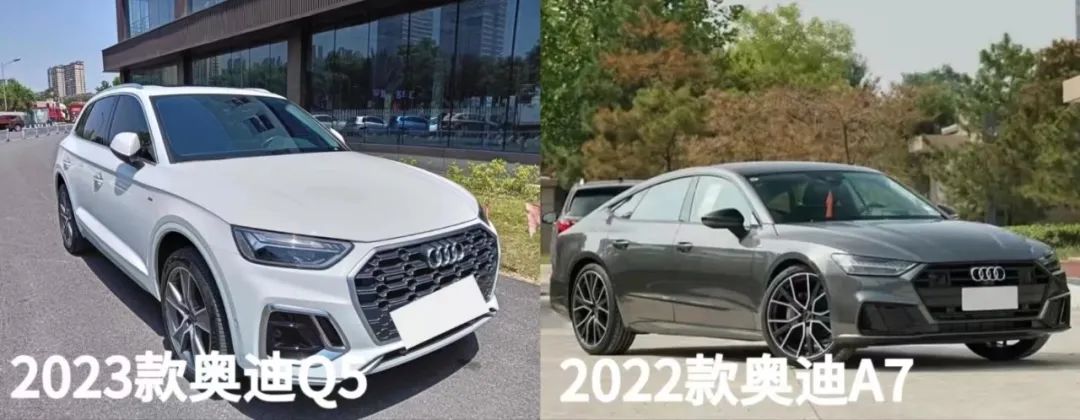
Image/Recalled Audi brand models
Source/Internet New Energy View screenshot
The recalled Ford vehicles amount to 20,484, including the 2020-2024 models of the Ford Escape and the 2021-2024 models of the Lincoln Corsair.
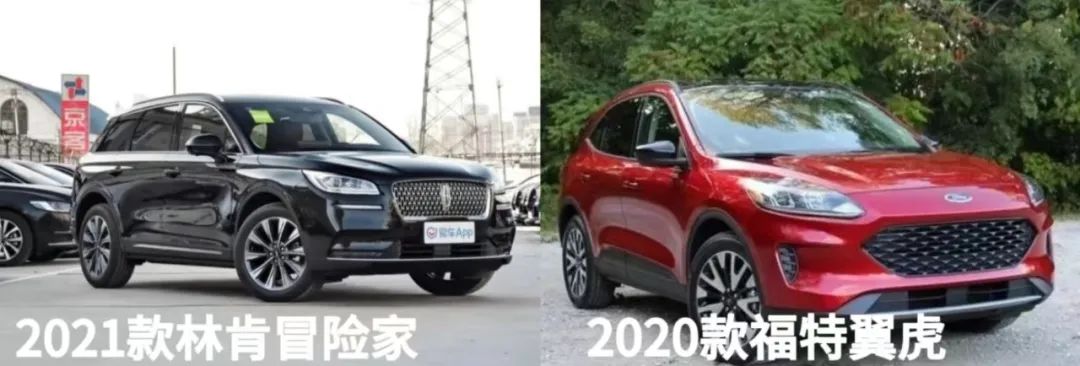
Image/Recalled Ford brand models
Source/Internet New Energy View screenshot
According to the recall report, damage to the separators within Samsung battery cells may lead to thermal overload or internal short circuits. Chrysler and Audi stated that affected vehicles may catch fire without prior warning, while Ford vehicles may display a "Stop Safely Now" message before a fault occurs.
Technology is the core competitiveness of a company in market competition. Such a large-scale recall has raised strong doubts about the technical reliability of Samsung batteries, causing Samsung's reputation in the battery technology field to plummet. Samsung batteries, once considered technologically advanced, are now being questioned for their inadequate technology.
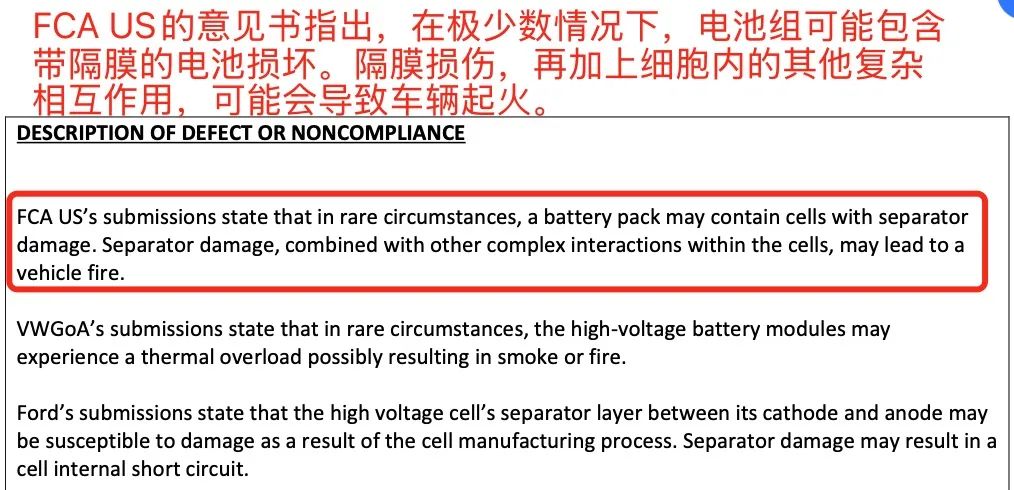
Image/NHTSA announces possible hazards and causes
Source/Internet New Energy View screenshot
Take Ford as an example. As one of the main brands affected by this recall incident, Ford is likely to reassess its partnership with Samsung after experiencing this recall. Ford has a vast user base in the global automotive market, and its choice of battery suppliers will influence the battery configuration of many models. If Ford chooses to reduce or terminate its cooperation with Samsung, Samsung will lose this important market share.
Take another example, Jeep has always occupied a place in consumers' hearts with its image of being sturdy, durable, safe, and reliable. However, this battery issue has caused consumers to question the quality of Jeep. All of this is inseparable from the faults of Samsung batteries.
These brands have a high influence in the automotive market, and their decisions will have a demonstration effect on the entire industry. Once these brands reduce their cooperation with Samsung, Samsung's market share in the automotive power battery market will decline significantly.
3. Irreversible Situation: Can Samsung Save the Day?
In fact, this is not the first time that Samsung batteries have faced the test of "fire".
In 2016, the Samsung Galaxy Note 7 caused a worldwide sensation with the "battery gate" incident. At that time, Note 7 smartphones frequently caught fire and exploded due to battery defects. This incident was like a storm, rapidly sweeping across the globe, bringing catastrophic consequences to Samsung. The brand image was severely damaged, consumer trust in Samsung products plummeted, sales fell sharply, and Samsung also faced huge compensation and recall costs.
Obviously, the smartphone battery explosion incident caused great harm to Samsung itself. Although its global market share has recovered after years of effort, the Chinese market has yet to recover and has lingered at the bottom. This shows that it is easy to lose the market, but rebuilding market confidence is much more difficult.
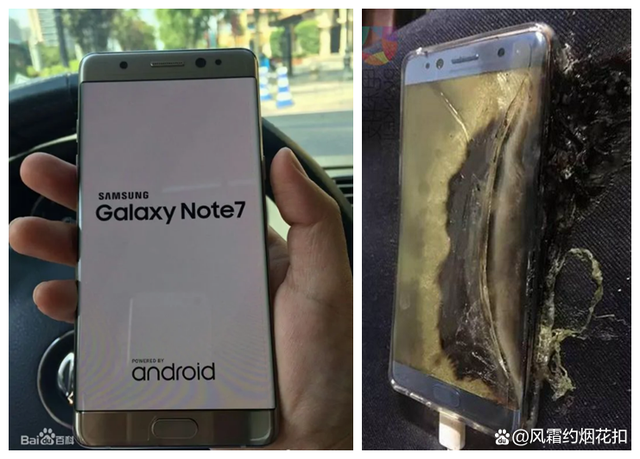
Image/Note 7 smartphone battery explosion
Source/Internet New Energy View screenshot
This time, Samsung batteries have serious safety issues in the automotive field, once again standing at the forefront of public opinion. Where will it lead Samsung?
It is certain that Samsung batteries are now in a more severe safety crisis due to this large-scale vehicle recall incident. After all, compared to the lethality of smartphone explosions, electric vehicle spontaneous combustion is far more dangerous.
The problem with the separators in Samsung's power battery cells involves both internal factors such as technology and quality control, as well as external pressures such as competition from peers. If Samsung wants to save the day and stabilize the crumbling edifice, it is imperative to increase R&D investment to improve technology.
As a core component inside the battery, the performance of the separator is directly related to the safety and stability of the battery. The shortcoming of Samsung batteries in this key technology may be an important reason why they have repeatedly fallen into the "fire sea".
In addition to technical issues, Samsung batteries also have obvious loopholes in quality control. From the manufacturing to the assembly of battery cells, negligence in any link may lead to safety hazards. The recall incident has exposed Samsung's lax control over the manufacturing process, further exacerbating consumers' concerns about its quality.
It should be noted that four years ago, Samsung SDI's global market share was 10.1%, ranking third. Nowadays, Samsung SDI's market share has fallen to 4.4%, ranking seventh.
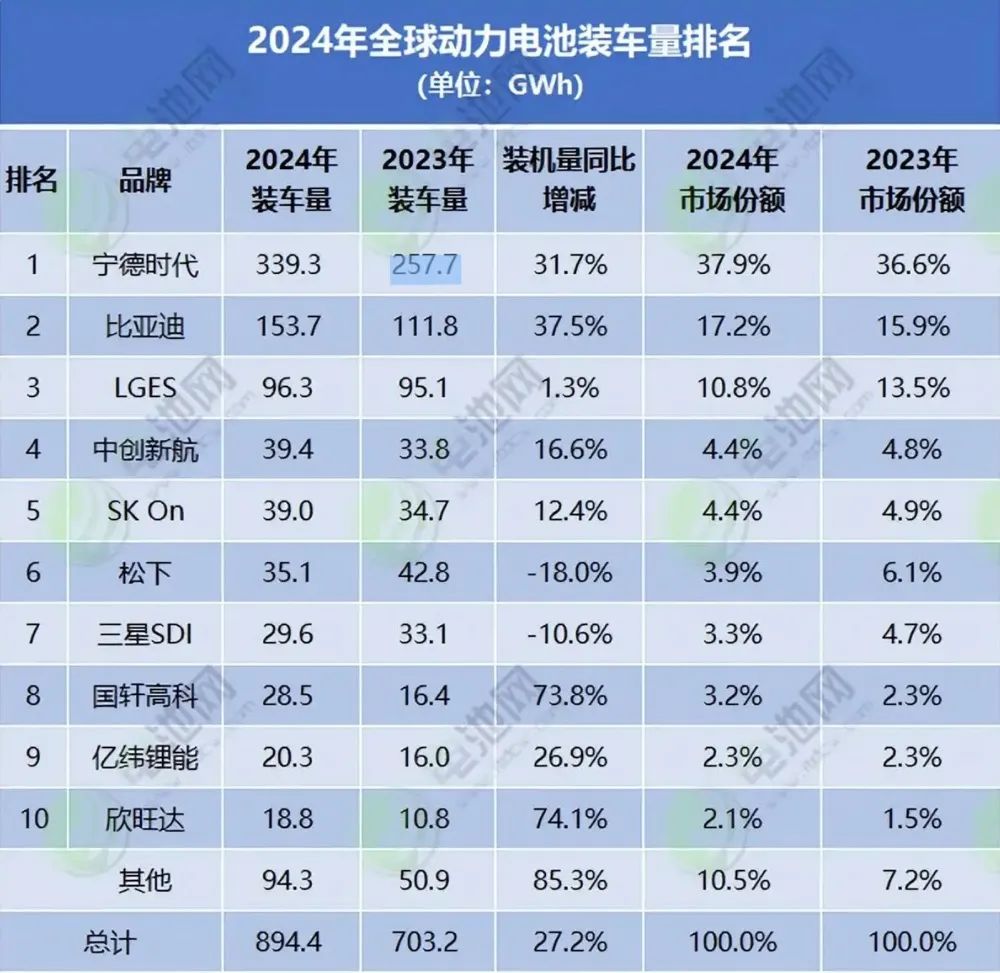
Image/2024 global power battery shipments ranking
Source/Internet New Energy View screenshot
Restoring market trust is undoubtedly the direction Samsung SDI should strive for. Samsung needs to prove the safety and reliability of its battery products through practical actions and gradually win back market trust through long-term and stable product quality performance.
However, after consumers and automakers have experienced this incident, especially after Chinese battery enterprises have won the trust of the world with their good reputation, will the market still give Samsung SDI a chance?
From glory to decline, Samsung batteries' experience has provided a profound lesson for the entire industry. In today's increasingly competitive power battery industry, technological innovation and quality control are the keys to a company's survival and development. Whether Samsung batteries can rise from the ashes during this crisis will depend on whether they can truly address their technological shortcomings and rebuild market trust. Otherwise, the "fire alarm" for Samsung batteries may only be the beginning of their decline.







